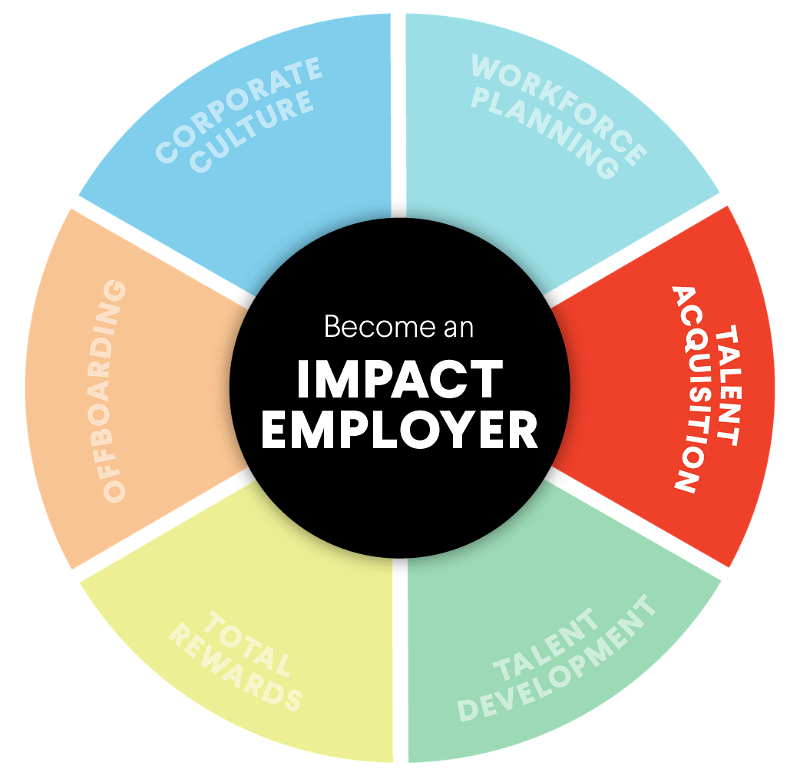
Talent Acquisition
June 16, 2021
At a Glance
Recovery Playbook for Impact Employers | Purpose driven, employee-centric workplace
Why It Matters

You will need a high-quality workforce to respond to the incredible demands of our shifting economy.
Impact Employers understand that the talent market is abruptly changing; regularly assess their needs and act accordingly. Some may curtail hiring during the recovery, but others will go on hiring sprees as the labor supply expands and workers migrate from hard-hit industries like retail, entertainment, and tourism to more stable sectors of the economy like food production, logistics, and technology.
New Challenges During Recovery

The talent acquisition processes that companies have relied upon for decades have been completely upended. With in-person interviewing and corporate site visits on hold, hiring managers are forced to find innovative ways to assess competency and fit in a virtual environment. And, with the rapid adoption of online tools, jobseekers with limited digital literacy require extra support to navigate the online application and hiring process.
Additionally, traditional pipelines for talent have been disrupted. This is not only due to limited in-person interactions but also because of increased corporate leadership commitments to diversity and skills-based hiring and advancement, which require added support to ensure fairness and inclusivity for nontraditional jobseekers.
How to Do It Well
Emerging Practices for an Equitable Recovery
- Connect with other businesses. Build relationships and pipelines with businesses in different but related industries and sectors to intercept and hire displaced workers who possess relevant skills for your business.
- Accommodate different levels of digital literacy in the hiring process. Provide additional support to prospective employees to help them successfully navigate the online application and hiring process.
- Get managers up to speed. Provide timely training and education for hiring managers/recruiters on new processes, policies, and priorities related to changes in talent pipelines (e.g., diversity, partnerships, and digital literacy).
- Set ambitious diversity targets, and report outcomes. Go beyond just connecting talent acquisition practices with diversity commitments, and move toward setting and meeting ambitious targets for creating and sustaining new and equitable talent pipelines. Report targets and outcomes to external constituents.
Existing Impact Employer Practices Are More Crucial Than Ever

- Increase the focus on skills. Use skills-based assessments instead of credential-based resumes to recruit and hire job candidates.
- Decrease the focus on degrees. Remove extraneous requirements for applicants (e.g., college degrees or years of experience).
- Create an inclusive environment. Create employee resource or affinity groups for people who come from underrepresented populations, to attract, cultivate, and retain diverse talent.
- Foster new talent pipelines. Partner with local community-based organizations or community colleges to develop new and diverse talent pipelines.
Employee Perspective
I was working in a temporary capacity for a well-known, global company. I was hired as the executive assistant for the chief legal officer. After six months, the company hired an individual who had a degree, over me—someone without a formal credential, but who had been successfully performing in the role for months. This is a great example of when removing extraneous requirements, such as a college degree, would have worked well, for both the company and for me.
Debra Ethan, employee via Jobcase
Employer Spotlight
As an essential business during the COVID-19 pandemic, Walmart saw an increased need for talent, and we are pleased to have hired over 500,000 new associates during the course of 2020. We recognized that businesses in other industries were laying off employees with related and transferable skills, so we set out to create a bridge to mutually benefit both Walmart and those displaced workers. This not only allowed Walmart to meet its rapidly changing talent needs, but also provide valuable employment opportunities for workers affected by COVID-related layoffs.
Gayatri Agnew, senior director, Corporate Philanthropy, Walmart
Related content

Corporate Action Platform
Corporate Action Platform Corporate leaders tap into JFF’s influence, resources, peer groups, and tools to learn what works, engage with changemakers, and adopt best practices that drive real return for businesses and their workers. Learn…

Recovery Playbook for Impact Employers
This special edition of our Impact Employer Framework offers insights into the unique challenges companies face in this moment, along with emerging practices to help business leaders navigate recovery from the COVID-19 pandemic and related…

Corporate Leadership
JFF works with companies to help them solve pressing business challenges in a way that’s good for workers, communities, and the bottom line. JFF works with companies to help them solve pressing business challenges in…